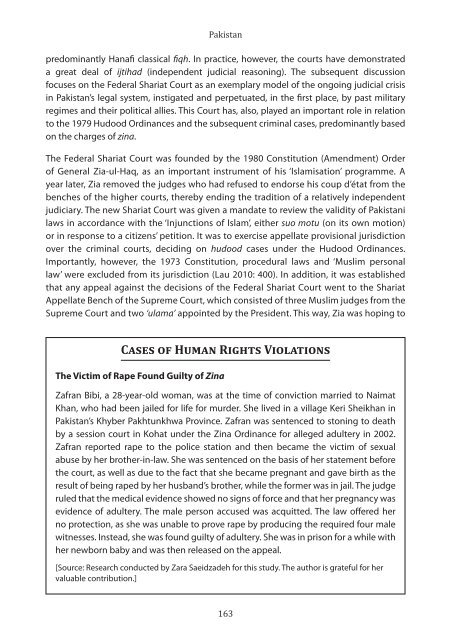control and sexuality
control and sexuality
control and sexuality
- No tags were found...
Create successful ePaper yourself
Turn your PDF publications into a flip-book with our unique Google optimized e-Paper software.
Pakistanpredominantly Hanafi classical fiqh. In practice, however, the courts have demonstrateda great deal of ijtihad (independent judicial reasoning). The subsequent discussionfocuses on the Federal Shariat Court as an exemplary model of the ongoing judicial crisisin Pakistan’s legal system, instigated <strong>and</strong> perpetuated, in the first place, by past militaryregimes <strong>and</strong> their political allies. This Court has, also, played an important role in relationto the 1979 Hudood Ordinances <strong>and</strong> the subsequent criminal cases, predominantly basedon the charges of zina.The Federal Shariat Court was founded by the 1980 Constitution (Amendment) Orderof General Zia-ul-Haq, as an important instrument of his ‘Islamisation’ programme. Ayear later, Zia removed the judges who had refused to endorse his coup d’état from thebenches of the higher courts, thereby ending the tradition of a relatively independentjudiciary. The new Shariat Court was given a m<strong>and</strong>ate to review the validity of Pakistanilaws in accordance with the ‘Injunctions of Islam’, either suo motu (on its own motion)or in response to a citizens’ petition. It was to exercise appellate provisional jurisdictionover the criminal courts, deciding on hudood cases under the Hudood Ordinances.Importantly, however, the 1973 Constitution, procedural laws <strong>and</strong> ‘Muslim personallaw’ were excluded from its jurisdiction (Lau 2010: 400). In addition, it was establishedthat any appeal against the decisions of the Federal Shariat Court went to the ShariatAppellate Bench of the Supreme Court, which consisted of three Muslim judges from theSupreme Court <strong>and</strong> two ‘ulama’ appointed by the President. This way, Zia was hoping toCases of Human Rights ViolationsThe Victim of Rape Found Guilty of ZinaZafran Bibi, a 28-year-old woman, was at the time of conviction married to NaimatKhan, who had been jailed for life for murder. She lived in a village Keri Sheikhan inPakistan’s Khyber Pakhtunkhwa Province. Zafran was sentenced to stoning to deathby a session court in Kohat under the Zina Ordinance for alleged adultery in 2002.Zafran reported rape to the police station <strong>and</strong> then became the victim of sexualabuse by her brother-in-law. She was sentenced on the basis of her statement beforethe court, as well as due to the fact that she became pregnant <strong>and</strong> gave birth as theresult of being raped by her husb<strong>and</strong>’s brother, while the former was in jail. The judgeruled that the medical evidence showed no signs of force <strong>and</strong> that her pregnancy wasevidence of adultery. The male person accused was acquitted. The law offered herno protection, as she was unable to prove rape by producing the required four malewitnesses. Instead, she was found guilty of adultery. She was in prison for a while withher newborn baby <strong>and</strong> was then released on the appeal.[Source: Research conducted by Zara Saeidzadeh for this study. The author is grateful for hervaluable contribution.]163


